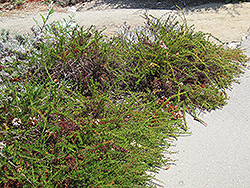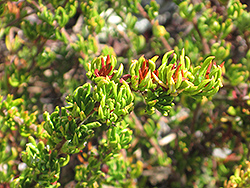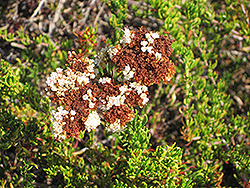It's all about ...
plants

Dana Point Buckwheat
Eriogonum fasciculatum 'Dana Point'
Height: 4 feet
Spread: 6 feet
Sunlight:
![]()
![]()
Hardiness Zone: 8b
Other Names: California Buckwheat
Description:
A tough, attractive mounded plant for use in low maintenance landscaping or xeriscaping; a native shrub featuring bright green leaves and white flowers in summer, persisting for a long time; excellent for naturalizing and erosion control
Ornamental Features
Dana Point Buckwheat features showy clusters of white flowers rising above the foliage from late spring to late fall. The flowers are excellent for cutting. It has attractive light green evergreen foliage which emerges red in spring. The tiny narrow leaves are highly ornamental and remain light green throughout the winter. The smooth gray bark adds an interesting dimension to the landscape.
Landscape Attributes
Dana Point Buckwheat is a dense multi-stemmed evergreen shrub with a mounded form. Its relatively fine texture sets it apart from other landscape plants with less refined foliage.
This is a relatively low maintenance shrub, and should only be pruned after flowering to avoid removing any of the current season's flowers. It is a good choice for attracting birds, bees and butterflies to your yard. Gardeners should be aware of the following characteristic(s) that may warrant special consideration;
- Self-Seeding
Dana Point Buckwheat is recommended for the following landscape applications;
- Mass Planting
- Rock/Alpine Gardens
- General Garden Use
- Groundcover
- Naturalizing And Woodland Gardens
Planting & Growing
Dana Point Buckwheat will grow to be about 4 feet tall at maturity, with a spread of 6 feet. It tends to fill out right to the ground and therefore doesn't necessarily require facer plants in front. It grows at a fast rate, and under ideal conditions can be expected to live for approximately 20 years. As this plant tends to go dormant in summer, it is best interplanted with late-season bloomers to hide the dying foliage.
This shrub does best in full sun to partial shade. It prefers dry to average moisture levels with very well-drained soil, and will often die in standing water. It is considered to be drought-tolerant, and thus makes an ideal choice for xeriscaping or the moisture-conserving landscape. It is not particular as to soil pH, but grows best in poor soils, and is able to handle environmental salt. It is highly tolerant of urban pollution and will even thrive in inner city environments. This is a selection of a native North American species.; however, as a cultivated variety, be aware that it may be subject to certain restrictions or prohibitions on propagation.
This plant is not reliably hardy in our region, and certain restrictions may apply; contact the store for more information.


